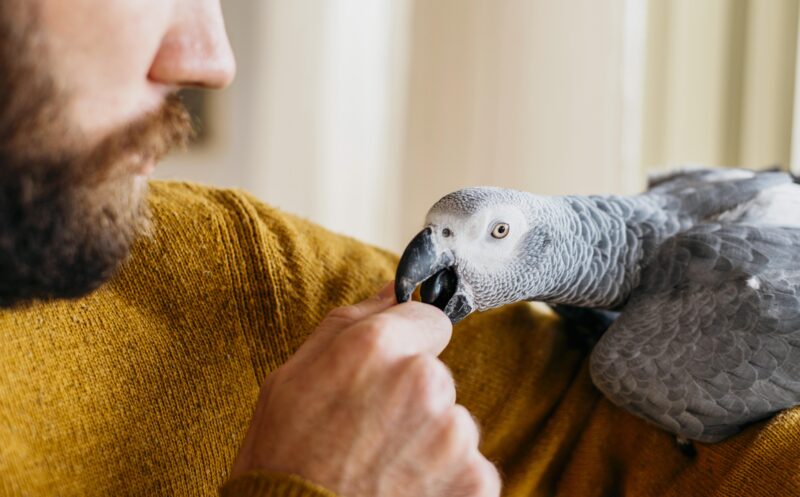Find the Perfect Furry (or feathered or scaly) companion for your retirement
So you made it to retirement.
Time for rest. Nonstop vacation. Every day is Saturday.
You deserve to enjoy your time.
But some retirees return to work, and 34% of those who do are searching for a sense of purpose. Having responsibilities and structure is fulfilling for people.
If you don’t want to go back to work, another option is adopting a new companion for your life.

There are many big and small animals that you can bring into your home. The question is what’s right for you?
General Considerations
You have a lot of factors to weigh: do you live alone, or with others? Allergies? Budget? Size of your house or apartment? Physical limitations?
Before considering the temperament of different animals, consider these big picture questions.
How much pet can you afford?
Retirement puts you on a budget. It might not be wise to choose a more expensive pet if it means having to sacrifice something else.
Cost considerations affect whether you adopt a pet from a shelter, buy from a breeder, or something else.
There are also certain setup costs for pets—do they need a cage or a tank? What kind of food do they eat?
Ongoing costs include food, toys, and vet bills. Some species and some breeds are even known to have more health problems than others.
You might spend $200 a year for some pets, and almost $2000 a year for others. What average costs can you afford?
Do you want the energy of a young animal?
If you’re considering a larger animal like cats and dogs…how much energy do you want?
Getting a slightly older pet means that they’ll have their personality and habits more established, but they’ll also be lower energy and less likely to need training on how not to chew on furniture.
And since their personality should be more set, it’ll be easier to know beforehand whether they’ll be a good fit for your household.
But the curiosity and energy of a young animal can bring joy to your day. You might enjoy the task of training them yourself.
It depends upon your needs and situation.
Remember your heirs
To be morbid for a moment, neither you nor your pet will live forever.
You have no guarantees on how long either of you will live, so it’s good to consider the average lifespan of the pets you’re looking at.
Do you want one around a little longer, like a cat, or a short commitment, like a betta fish?
Unless your heirs are also pet people, it’s probably a good choice to get a pet that is less likely to outlive you.
Sorry, might not be a great time to invest in a large parrot or a tortoise that can live 50 years.
America’s Most Popular Pets
Now that you have a general framework for the big questions of what you’re looking for, one of the six most popular pets will be sure to fit the bill.
Dogs
There’s a lot of variety among dogs.
In general, they’ll be the most demanding of your attention, so they’re perfect if you look forward to walks and have the energy for canine maintenance.
They’ll also be the most expensive.
Larger dog breeds require more physical strength, especially if you choose to train them as a puppy. They’re excellent companions for staying in shape and can be a trusty guard for your property.
You’ll need less strength to handle a small dog breed, although they’ll still need to get outside and burn off energy (and use the bathroom!).
Cats
If you’d prefer a cuddly creature who is more self-reliant, cats are a great option.
They’re not quite as expensive as dogs—although they do often live twice as long—but they handle their own bathroom habits, groom themselves, and don’t need walks.
Individual feline temperaments vary, so some will want more attention and interaction than others. They’re often known for being more finicky than dogs. But they can be good company without as much daily time commitment.
Fish
If you don’t care about interaction, but welcome the idea of some routine, fish upkeep might be a good option for you.
The upfront costs can be steep, depending on what kind of fish you want and what sort of tank is recommended. But once you have everything set up, your work is limited to feeding the fish and cleaning the tank.
It’s a great way to get a daily routine. Plus, allergies will be no issue!
Birds
Birds, mostly small parakeets, are popular pets in the US.
They generally stay in their cages, but you can let them fly around if you want more diversion.
As with fish, the main responsibilities for birds are to clean and feed, although they’ll interact with you a bit more. You can touch birds and listen to them sing.
But if you don’t want the noise, best reconsider. Dogs and birds are likely the loudest of the popular pets. What level of noise is tolerable to you and your neighbors?
Small Mammals
This is a large category—rabbits, hamsters, gerbils, rats, mice…
For some people, these are more ‘pests’ than ‘pets’.
But each little creature can be a fun companion in the right home.
Small mammals have the advantage of being caged like fish or birds, so messes are contained. But as mammals, they (usually!) still enjoy being petted and picked up.
They may need help getting used to being handled, so you’ll have a chance to do a little more bonding and training.
They’re also a budget friendly pet!
Reptiles
If some people see small mammals as pests, some definitely see reptiles and think ‘danger!’ So a reptile might be a no-go from the start.
But if you don’t mind lizards and snakes—or feeding them insects—reptiles can be a great choice.
Also caged, reptiles need little interaction from you and sometimes not even daily feeding. Many don’t mind being gently handled, if you want something a little more hands-on than a fish.
Costs will vary depending on what breed you get and what they need to eat, but they’re midrange in terms of overall expenses.
And they’re quite a conversation piece!
Above All: Be Realistic
Whichever pet fits your retirement situation best, they all provide a wonderful sense of purpose, entertainment, and companionship (Yes, even snakes!). But it is a commitment—whether for two years or two decades—so be sure to weigh your living situation and what will fit.
You might love big dogs, but they’re not a great choice for a small apartment (if your landlord even allows them).
You might want a pet rat, but the thought gives your significant other nightmares.
Before you buy, be sure to ask all your questions to a pet owner you trust or someone at the shelter or store.
That’s the best way to set you and your new friend up for success.


